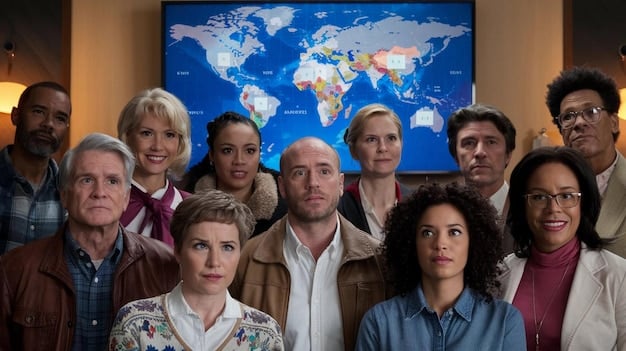The US and the UN: America’s Role in Global Governance 2025

In 2025, the United States’ role within the United Nations will continue to be pivotal, shaped by factors like evolving global challenges, domestic political shifts, and the ongoing debate over multilateralism versus unilateralism in addressing international issues.
The relationship between the US and the UN: Understanding America’s Role in Global Governance in 2025 is set to be a complex interplay of cooperation and contention, influenced by a rapidly changing global landscape and domestic policy considerations. Exploring this dynamic reveals potential shifts in international relations.
The Evolving Landscape of US-UN Relations
The dynamic between the United States and the United Nations is constantly evolving, shaped by a complex interplay of global events, domestic politics, and shifting priorities. Understanding this relationship is crucial for grasping the future of international relations.
As we look ahead to 2025, several factors will likely influence the US approach to the UN. These include ongoing geopolitical tensions, emerging global challenges such as climate change and pandemics, and domestic debates about the role of the US in multilateral institutions.
Key Challenges Facing the UN
The United Nations faces numerous challenges that affect its ability to effectively address global issues.
- Funding and Resources: Ensuring adequate and sustainable funding for UN programs and initiatives.
- Bureaucracy and Efficiency: Streamlining operations to improve efficiency and reduce bureaucratic hurdles.
- Political Gridlock: Overcoming political divisions and veto powers within the Security Council to enable decisive action.

These challenges underscore the need for reforms and renewed commitment from member states, particularly the United States, to strengthen the UN’s capacity to address pressing global issues. The US role in providing leadership and resources will be critical in shaping the UN’s effectiveness in the coming years.
In conclusion, the US-UN relationship in 2025 will depend on how both entities navigate these evolving challenges and priorities. A strong, collaborative partnership is essential for addressing global issues effectively. While the path may be complex, the potential benefits of a cooperative relationship are significant for global stability and progress.
US Priorities and Focus Areas at the UN
The United States approaches the United Nations with a set of priorities that reflect its national interests and global objectives. These priorities often shape its engagement, contributions, and policy positions within the UN system.
In 2025, we can expect the US to focus on several key areas, including global security, humanitarian assistance, and sustainable development. However, the specific emphasis and approach may vary depending on the administration in power and the prevailing geopolitical landscape.
Areas of Strategic Importance for the US
The United States has several strategic interests within the UN framework.
- Counter-Terrorism Efforts: Collaborating with UN agencies to combat terrorism and prevent the spread of extremist ideologies.
- Nuclear Non-Proliferation: Working to prevent the proliferation of nuclear weapons and ensure global nuclear security.
- Human Rights Promotion: Advocating for the protection of human rights and fundamental freedoms around the world.
These strategic priorities guide the US engagement with the UN and influence its policy positions on various global issues. In 2025, it is likely that the US will continue to emphasize these areas, while also adapting its approach to address new and emerging challenges.
In closing, the US priorities and focus areas at the UN in 2025 will reflect its national interests and global objectives. By focusing on key strategic areas and adapting to emerging challenges, the US can play a significant role in shaping the UN’s agenda and promoting global stability and security.
Potential Shifts in US Policy Towards the UN
The United States’ policy towards the United Nations is subject to change, influenced by domestic politics, shifts in global power dynamics, and evolving national interests. These shifts can have a significant impact on the US-UN relationship.
Looking ahead to 2025, it is important to consider potential changes in US policy towards the UN. These changes could involve alterations in funding levels, shifts in diplomatic approaches, and adjustments to the US stance on key global issues.
Factors Influencing US Policy Shifts
Several factors could drive shifts in US policy towards the UN.
- Domestic Political Changes: Changes in the US administration or congressional leadership can lead to significant policy shifts.
- Global Crises and Conflicts: Emerging crises and conflicts can prompt the US to reassess its engagement with the UN.
- Economic Considerations: Economic pressures and budget constraints can influence the level of US financial support for the UN.

These factors highlight the dynamic nature of US policy towards the UN and the importance of monitoring these developments. In 2025, changes in these areas could lead to significant shifts in the US-UN relationship, with potential implications for global governance and international cooperation.
In summary, potential shifts in US policy towards the UN could have far-reaching consequences for global governance and international cooperation. By understanding the factors that drive these shifts and monitoring developments in these areas, it is possible to anticipate and prepare for changes in the US-UN relationship.
The Role of Multilateralism vs. Unilateralism
The debate between multilateralism and unilateralism has long shaped the United States’ approach to international relations, including its engagement with the United Nations. This debate centers on the extent to which the US should cooperate with other nations and international organizations versus pursuing its interests independently.
In 2025, the balance between multilateralism and unilateralism in US foreign policy will continue to be a key factor in shaping its role within the UN. The choice between these approaches will influence the US approach to global challenges.
Arguments for Multilateralism and Unilateralism
There are compelling arguments for both multilateralism and unilateralism.
- Multilateralism: Emphasizes cooperation and collaboration with other nations to address global issues collectively.
- Unilateralism: Prioritizes the pursuit of national interests independently, with less emphasis on international cooperation.
- The Middle Ground: A balanced approach, strategically using both multilateral and unilateral actions based on the specific context.
The ongoing debate between multilateralism and unilateralism will continue to shape the US approach to international relations and its role within the UN in 2025. By carefully considering the arguments for both approaches and adapting its policies to the evolving global landscape, the US can effectively navigate the challenges and opportunities of global governance.
In conclusion, the role of multilateralism versus unilateralism will continue to be a critical factor in shaping the US approach to international relations and its engagement with the United Nations in 2025. By understanding the arguments for both approaches, policymakers can make informed decisions.
The US and UN Sustainable Development Goals (SDGs)
The Sustainable Development Goals (SDGs), adopted by the United Nations in 2015, represent a global agenda for addressing pressing economic, social, and environmental challenges. The United States plays a significant role in supporting and implementing the SDGs.
In 2025, the US engagement with the SDGs will continue to be an important aspect of its role in global governance. This engagement will involve efforts to promote sustainable development both domestically and internationally, aligning US policies and resources with the SDGs.
Key SDGs and US Engagement
The United States is engaged in various SDGs.
- SDG 3: Good Health and Well-Being: Improving access to healthcare and addressing global health challenges.
- SDG 4: Quality Education: Ensuring inclusive and equitable education for all.
- SDG 13: Climate Action: Reducing greenhouse gas emissions and mitigating the impacts of climate change.
By focusing on these key SDGs and aligning its policies and resources accordingly, the US can contribute to global efforts to achieve sustainable development.
In summary, the US engagement with the UN Sustainable Development Goals (SDGs) will remain an important aspect of its role in global governance in 2025. By aligning its policies and resources with the SDGs and collaborating with other nations, the US can contribute to a more sustainable and equitable future for all.
Future Challenges and Opportunities for the US at the UN
As we look ahead to 2025, the United States faces a range of challenges and opportunities in its relationship with the United Nations. These challenges and opportunities will shape the US role in global governance and its ability to address pressing global issues.
The US role in the UN will depend on how effectively it navigates these challenges and leverages the opportunities for cooperation that the organization provides.
Addressing the Challenges
There are many challenges to overcome.
- Geopolitical Tensions: Navigating complex geopolitical dynamics and conflicts among member states.
- Financial Constraints: Managing budget constraints and ensuring sustainable funding for UN activities.
- Maintaining Influence: Preserving US influence and leadership within the UN system.
By addressing these challenges and seizing the opportunities for cooperation, the US can play a constructive role in shaping the future of the UN and promoting global stability and prosperity.
In closing, the United States faces a range of challenges and opportunities in its relationship with the United Nations in 2025. By addressing these challenges, the US can play a constructive role in global governance and promote a more peaceful and prosperous world.
| Key Point | Brief Description |
|---|---|
| 🌍 Evolving US-UN Relations | Dynamic interplay shaped by global events and domestic politics. |
| 🎯 US Priorities at UN | Focus on global security, humanitarian aid, and sustainable development. |
| ⚖️ Multilateralism vs. Unilateralism | Debate shaping US foreign policy and UN engagement. |
| 🌱 US and UN SDGs | Engagement promoting sustainable development domestically and internationally. |
Frequently Asked Questions
▼
The UN faces persistent funding issues, struggles with bureaucratic inefficiencies, and deals with political gridlock, particularly within the Security Council, hindering its ability to act decisively on global issues.
▼
Future shifts in US policy could arise due to domestic political changes, global crises prompting reassessments, or economic constraints affecting financial support. Each could alter US involvement significantly.
▼
The US focuses on counter-terrorism, nuclear non-proliferation, and human rights promotion. These priorities guide US engagement and influence policy stances on various global challenges.
▼
The debate affects how the US approaches international relations, steering it towards cooperating with other nations or pursuing its interests independently, impacting its role and effectiveness within the UN.
▼
The US supports the SDGs by aligning domestic and international policies to promote health, education, and climate action, contributing to global efforts for a sustainable and equitable future.
Conclusion
Understanding the US and the UN: Understanding America’s Role in Global Governance in 2025 requires considering the evolving landscape of international relations, shifts in domestic policy, and the ongoing debate between multilateralism and unilateralism. As the US navigates these complexities, its engagement with the UN will continue to shape the global response to pressing challenges and opportunities.





